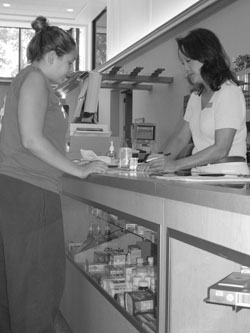Let’s Talk About Sex, Baby
Mollie Gets Serious About Using Protection, Honesty

Gyrating flesh, undulating underneath baggy pants and crop tops, swaying to the rhythm of background beats and a choreographer’s cues. Forbidden phrases and words I had only heard before in hushed playground whispers, delivered by wide-eyed, pigtailed girls whose parents weren’t quite as protective as my own. Rapid remote-grabbing, and frantic flipping of channels whenever my parents did walk in to find me watching. These are my first memories of MTV and, specifically, of watching those girlish greats – TLC, Salt-n-Pepa, En Vogue, Mariah, and Janet – shaking their respective groove things in music videos my mother expressly forbade me to watch. Of course I watched anyway.

Ever since those halcyon days of stealing covert glimpses at the girls on MTV, I’ve understood that sex is the ultimate touchy topic. Of course, as I got older, things changed. My mother went from chastising me for ogling the oversexed video vixens to checking in to see if I wanted to “talk about anything.” For every year I aged, the discourse surrounding sex got more open.
By the time I hit high school, the days of discreetly whispering were long gone, replaced by a kind of candid candor bordering on competition; who could say the most shocking stuff in the least embarrassed way. We watched Jenna Jameson show off just how far porn profits could take a girl on MTV’s Cribs. By the time I was in high school, the video vixens had been replaced by reality TV, and we heard the girls on Sex and the City dish about doing it over their coffee and eggs. We sang along to Bloodhound Gang’s “The Bad Touch,” and we wore the skimpiest ensembles we could get away with.
Of course, it wasn’t all innocent innuendo and fresh-faced fun. We were also the first generation that grew up with the reality of AIDS looming over all of our potential partners like a predatory specter, ready to pounce if we were the least bit irresponsible in our adolescent explorations of each other. In assemblies and health classes, we were warned about the direst consequences of copulation. From The Real World’s Pedro to the NBA’s Magic Johnson, we watched cultural icons deal with the disease, revered by some, reviled by others, but always held at a bit of an arm’s length by those of us who watched from afar. They were characters we sympathized with, but God forbid you start to identify with them.
The result, I think, was a whole lot of mixed messages. On the one hand, we were all too happy to harp on sex; to talk about proclivities, passions, and positions until our faces – and possibly other parts – turned blue. But, on the other hand, we were scared to get serious. I could talk for ages with my girlfriends about getting laid, but we wouldn’t dare discuss getting tested. Maybe all the discussion of disease created a sort of reverse stigma, where you wouldn’t want to admit you were scared of STDs for fear of being labeled as someone who might actually have reason to worry about them. Suddenly, it wasn’t sex that was discussed in hushed tones on the playground. It was sexually transmitted diseases. Who allegedly had herpes, who allegedly slept with that person, and who else may have allegedly already caught it from their ex-girlfriend’s boyfriend’s friend. It was all very high school.
Of course, now that our generation is in college, you’d think the conversation would have grown up a bit too. But, while the discussion of sex has gotten a bit more elegant – more experience, less eagerness to say things for shock value’s sake – the discussion of all of the act’s accoutrement is still relegated to the realm of whispers and innuendo. We’ll talk about penises, but not pills; testicles, but not testing. Between boyfriends and girlfriends, best friends and brethren, the stigma still exists.
In my humble opinion, if you’re not ready to discuss the consequences of coitus, you’re probably not ready to be having it. And with the wealth of resources available to us as college students – especially as college students at the relatively enlightened UCSB campus – there’s no reason not to take preventive measures like getting tested, taking birth control, and getting comfortable talking about the consequences of copulation.
And I’m not just preaching from a pious place of self-righteous removal. I actually recently had “The Talk” with my very own significant other. We discussed it all, from disease to decisions we would make if my birth control failed to protect us from an unwanted pregnancy. The conclusions we came to are private, but the fact that we talked about it is – and should be – very public. It made our relationship stronger, and made me much more secure in terms of our sex life.
By dealing with all sides of sex directly we were able to relegate it to the same realm as whether I like onions on my pizza and whether he’s willing to put up with my taste for crappy television. By discussing those things with each other early on in our relationship, we were able to avoid ever having to go through the potentially problematic experience of him ordering an unappetizing dinner, or me forcing the man I care so much about to sit through a Saturday’s worth of America’s Next Top Model reruns. Talking about testing is the same thing; it’s a much bigger deal when you don’t do than it is if you just get it over with.

Student Health Services even offers self-directed testing, so you don’t have to deal with a doctor. Just go into the lobby, grab a form from the kiosk of papers by the Green Hallway, fill it out, and bring it straight to the lab. They’ll process your blood and urine directly, and email you your results within a week. It’s cheap, confidential, and quick. While you’re at student health, pick up some free condoms from the basket – or just buy six for a dollar from the pharmacy. Also, ask about birth control. They get deals with some suppliers, so their prices are sometimes better than what you would find elsewhere. And both Student Health Services and the Rite Aid in Goleta sell the morning-after pill without a prescription, all you need is proof of age. So taking action before and after the actual act is as easy as a bike ride to the big building at the edge of campus.
And if all that action leaves you longing for more talk about the titillating topic, check out international reproductive health and rights advocate Edna Cano. She’ll be getting together with the California Public Interest Resource Group (CALPIRG), Campus Progress, and some of our very own students for the statewide Sex and the Environment Tour. Cano and others will be hosting a meeting in the UCen’s Mission Room on Thursday, November 8 at 6 p.m. to discuss the ways in which worldwide reproductive choices shape the state of the environment. It’s co-hosted by the Sierra Club, and more information is available if you email cassie.gardener@sierraclub.org.
And in the meantime, just remember the immortal words of the great Salt ‘n’ Pepa, in their seminal mid-90s hit, “Whatta Man”: “He always has heavy conversation for the mind. / Which means a lot to me, because good men are hard to find.” Sure, it may be grammatically incorrect, but the sentiment is spot-on. Because while the actual act of sex is great and all, nothing beats being with someone you can talk to about everything – even the stuff you’d rather just whisper about with your wide-eyed girlfriends.



